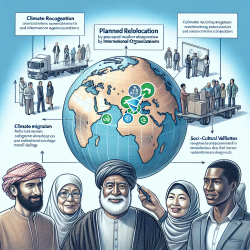The increasing frequency and severity of climate-induced hazards have made planned relocation a crucial adaptation mechanism. As practitioners in the field of planned relocation, understanding the role of international organizations in promoting equitable processes is essential. A recent policy analysis titled "The role of international organizations in equitable and just planned relocation" provides valuable insights into how these organizations can facilitate successful relocations. This blog post explores the key outcomes of the research and offers guidance for practitioners seeking to enhance their skills.
The Framework for Equitable Planned Relocation
The research outlines a framework centered on three core principles: comprehensive recognition of affected stakeholders, incorporation of socio-cultural risk factors, and evaluation based on multiple measures of well-being. These principles aim to address equity issues that often arise during planned relocations.
Recognition of Affected Stakeholders
The first principle emphasizes the importance of involving stakeholders in decision-making processes. Recognition involves more than mere consultation; it requires active participation and documented decision-making that reflects stakeholders' inputs. Practitioners should strive to create flexible relocation plans that offer multiple options, allowing communities to choose solutions that best fit their needs.
Incorporation of Socio-Cultural Risk Factors
Socio-cultural risk factors are social vulnerabilities rooted in power structures. Incorporating these factors into planning ensures distributive justice by addressing the unique needs of marginalized groups. Practitioners should conduct thorough assessments of these risks and engage with sub-communities to develop tailored solutions.
Evaluation Based on Multiple Measures of Well-Being
An equitable evaluation considers human well-being alongside economic and environmental outcomes. Practitioners should identify measures that capture the human impact of relocation and compare new living conditions to previous ones and agreed-upon standards. This approach ensures that relocations result in improved or at least comparable living conditions.
The Role of International Organizations
International organizations are uniquely positioned to promote equitable planned relocation through agenda-setting, funding, best practice dissemination, accountability, and coordination facilitation.
Agenda-Setting and Funding
International organizations can guide global attention toward coordinated action on planned relocation. They can also provide funding contingent upon the implementation of equitable policies, supporting countries in managing internal migration flows effectively.
Disseminating Best Practices and Establishing Accountability
The dissemination of best practices is crucial for learning from past experiences. International organizations can promote transparency and accountability by establishing standards for equitable action in planned relocations.
Facilitating Coordination Among Relevant Actors
The ability to coordinate among various actors is a powerful feature of international organizations. By facilitating collaboration between local governments, NGOs, and other stakeholders, they ensure that relocations are informed by a comprehensive understanding of community dynamics.
The Path Forward for Practitioners
The research highlights the importance of proactive planning with an equity-focused framework. Practitioners should implement these principles in their work to ensure just outcomes for relocated communities. Further research into specific processes that promote recognition via socio-cultural risk incorporation is needed to refine these approaches.
The role of international organizations in equitable and just planned relocation










